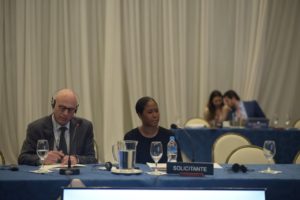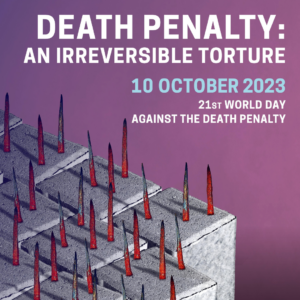
Inter-American Commission urges retentionist member states within the OAS to eliminate the death penalty
- News
- 19 Dec 2019
On the 12th November 2019, at the 174th Period of Sessions of the Inter-American Commission on Human Rights (IACHR) held in Quito, Ecuador, the Death Penalty Project appeared before the Commission at a thematic hearing on ‘The situation of the death penalty in the English-speaking countries of the Caribbean’. The delegation consisted of Co-Executive Director, Saul Lehrfreund, alongside Jamaican attorney Malene Alleyne and Kacey Mordecai: attorney and program officer at Robert F Kennedy Human Rights. The delegation provided an update on the progress that English-speaking Caribbean countries have made towards eradicating the death penalty, drawing attention to areas of particular concern including conditions of detention on death row and instances of States restricting judicial supervision over the application of the death penalty. In the Commission’s press release on the 174th Period of Sessions (20th November 2019), the IACHR asked those OAS member states that retain the death penalty to take proactive steps to move towards abolition:
“The IACHR was particularly concerned about the information it heard regarding the death penalty in countries in the Anglophone Caribbean. While these countries have not enforced the death penalty for more than 10 years, challenges remain to abolish this form of punishment. The organisations who requested the hearing that was held in this period of sessions said that death sentences continue to be used in a discriminatory way against vulnerable groups. They further noted the violation of the rights of individuals who are on death row, denounced the prevailing conditions of detention, and highlighted violations of due process that stem from a lack of access to an appeal to a different court in these cases. The IACHR urges the States who still apply the death penalty to either abolish it or at least impose a moratorium on its application.”
The death penalty is currently retained by approximately one-third of the OAS Member States, and of the 14 retentionist States, 12 of them are within the English-speaking Caribbean. Yet none of these have executed in over a decade – most for much longer – and the US is the only actively executing country within the OAS. At present, the English-speaking Caribbean has a death row population of at least 69 persons – namely in Barbados (10), Grenada (1), Guyana (15), St Vincent and the Grenadines (1) and Trinidad and Tobago (42). In this context, the Commission was invited to consider whether the obligation of OAS Member States to take proactive steps towards abolition should be reinforced; and whether this obligation should be stated in the same or similar terms to the UN Human Rights Committee’s (UNHRC) recent General Comment No. 36 – which affirms that States “should be on an irrevocable path towards complete eradication of the death penalty, de facto and de jure, in the foreseeable future.” The UNHRC have acknowledged that the death penalty cannot be reconciled with full respect for the right to life and that abolition of the death penalty is both desirable and necessary for the enhancement of human dignity and the progressive development of human rights.
Whilst the Inter-American Court has stated that the ultimate goal of the American Convention on Human Rights is the eventual eradication of capital punishment, and the IACHR has urged retentionist States to abolish the death penalty or to impose a moratorium on its use as a step towards abolition. Only four English-speaking Caribbean countries (Barbados, Dominica, Grenada, and Jamaica) have ratified the American Convention. Both Barbados and Dominica have made specific reservations to the American Convention with respect to their use of capital punishment, and Trinidad and Tobago denounced the American Convention in 1998 in order to continue to impose capital punishment in line with the laws of the country. Furthermore, none of these countries have ratified the Protocol to the American Convention on Human Rights to Abolish the Death Penalty.
In this context and given the de facto abolitionist status of all English-speaking Caribbean countries, there is a clear lack of momentum across the region towards complete abolition. This passivity is not necessarily reflective of any significant opposition to abolition, but rather demonstrates a reluctance to question the status quo. With no executions having taken place for over a decade across the region, and over two decades in many of these states, it seems clear that given the necessary impetus, meaningful steps could be taken towards the complete abolition of capital punishment in the English-Speaking Caribbean. Given the foregoing, the following requests were made of the IACHR at the conclusion of the hearing:
- To urge OAS retentionist States to move towards the complete eradication of the death penalty, de facto and de jure, in the foreseeable future and remind them that Article 4(2) of the American Convention on Human Rights should not be interpreted as justifying delay in bringing about abolition.
- To request information from OAS retentionist States on the prisoners on death row, including disaggregated information on their gender, demographics, length of sentence, and the measures taken to eradicate the death penalty in their respective jurisdictions.
- To urge OAS Member States that have not done so to ratify the American Convention on Human Rights and the Protocol to the American Convention on Human Rights to Abolish the Death Penalty.
- To conduct a fact-finding visit to the places of detention which house prisoners on death row, namely in Barbados, Guyana and Trinidad and Tobago, so that the Commission can gather testimonies on the conditions of detention on death row.
- To request an advisory opinion to the Inter-American Court of Human Rights, as established in Article 64(1) of the American Convention on Human Rights, on the meaning of Article 4(2) of the American Convention on Human Rights, particularly in light of developments in the universal human rights system.
- To engage with the UN Office of the High Commissioner for Human Rights with a view to taking joint action with UN human rights mechanisms to promote the eradication of the death penalty in OAS retentionist States, including by way of a joint declaration on the normative framework governing the application of the death penalty.
The full hearing is available to view online at: https://www.youtube.com/watch?time_continue=1011&v=c9NECHBXCmA&feature=emb_title



















